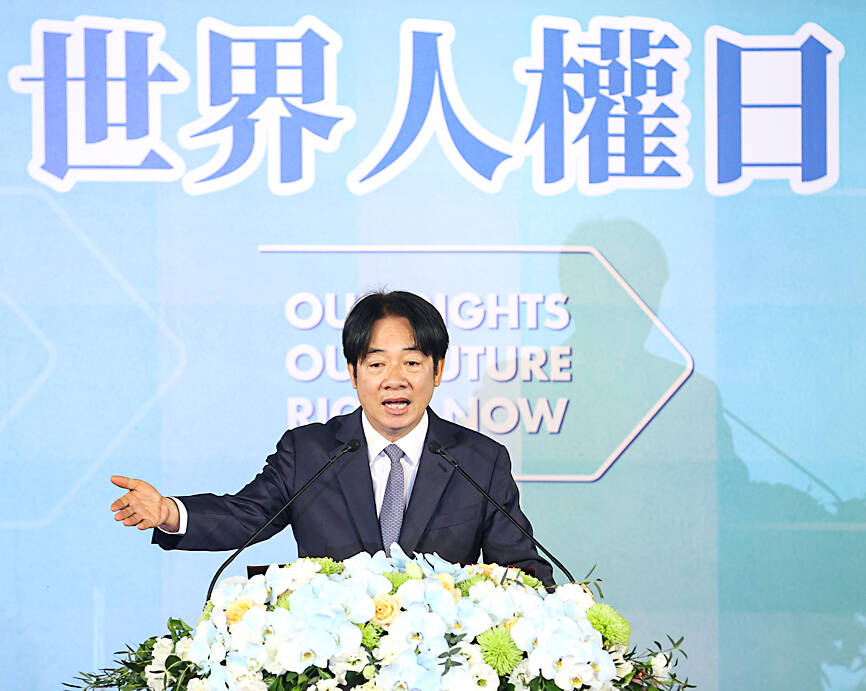President William Lai (賴清德) yesterday said that Taiwanese society had endured decades of harsh martial law and that such “historic mistakes” should never be repeated.
“Taiwan had 38 years of martial law rule, during which its social and economic [development] ... was greatly impacted, and such harm has continued to affect today’s society,” Lai said, referring to the Martial Law period from 1949 to 1987.
The imposition of martial law — the second-longest ever imposed by a regime in history — largely coincided with the White Terror, an era of political repression in Taiwan by the one-party state Chinese Nationalist Party (KMT) government from 1949 to 1992.

Photo: CNA
We must “learn from the lessons” and “must never repeat the historic mistakes,” Lai said at an event at the Jing-Mei White Terror Memorial Park (景美白色恐佈紀念園區) in New Taipei City marking International Human Rights Day, which is observed annually on Dec. 10.
He pledged to continue promoting transitional justice, focusing on restoring the truth about past state wrongdoing and “help[ing] the public understand the nature of authoritarian rule.”
Upholding democracy, freedom and human rights has allowed Taiwan to build connections with other countries, he said, adding that “we must unite ourselves and collaborate to preserve” these values.
Lai’s remarks came days after a social media post by the Democratic Progressive Party (DPP) caucus was accused of sympathizing with South Korean President Yoon Suk-yeol’s imposition of emergency martial law on Tuesday night.
The post repeated some of Yoon’s accusations and justifications behind the declaration, which sent shockwaves through South Korea and the world, including allegations that the South Korean parliament had been “manipulated by North Korean forces.”
The DPP post was deleted about 20 minutes after it was published and was replaced with another saying the previous one “only shared international information and compared it with the domestic political situation, and [the post] absolutely did not mean support for martial law.”
The KMT has criticized the statement and called on Lai, who chairs the DPP, to apologize and clarify his position.
However, the KMT also got into hot water when KMT Legislator Sra Kacaw in the legislature on Friday said that the KMT’s imposition of martial law in 1949 was meant to “protect Taiwan” from possible attacks by Chinese Communist Party forces.

MORE VISITORS: The Tourism Administration said that it is seeing positive prospects in its efforts to expand the tourism market in North America and Europe Taiwan has been ranked as the cheapest place in the world to travel to this year, based on a list recommended by NerdWallet. The San Francisco-based personal finance company said that Taiwan topped the list of 16 nations it chose for budget travelers because US tourists do not need visas and travelers can easily have a good meal for less than US$10. A bus ride in Taipei costs just under US$0.50, while subway rides start at US$0.60, the firm said, adding that public transportation in Taiwan is easy to navigate. The firm also called Taiwan a “food lover’s paradise,” citing inexpensive breakfast stalls

TRADE: A mandatory declaration of origin for manufactured goods bound for the US is to take effect on May 7 to block China from exploiting Taiwan’s trade channels All products manufactured in Taiwan and exported to the US must include a signed declaration of origin starting on May 7, the Bureau of Foreign Trade announced yesterday. US President Donald Trump on April 2 imposed a 32 percent tariff on imports from Taiwan, but one week later announced a 90-day pause on its implementation. However, a universal 10 percent tariff was immediately applied to most imports from around the world. On April 12, the Trump administration further exempted computers, smartphones and semiconductors from the new tariffs. In response, President William Lai’s (賴清德) administration has introduced a series of countermeasures to support affected

CROSS-STRAIT: The vast majority of Taiwanese support maintaining the ‘status quo,’ while concern is rising about Beijing’s influence operations More than eight out of 10 Taiwanese reject Beijing’s “one country, two systems” framework for cross-strait relations, according to a survey released by the Mainland Affairs Council (MAC) on Thursday. The MAC’s latest quarterly survey found that 84.4 percent of respondents opposed Beijing’s “one country, two systems” formula for handling cross-strait relations — a figure consistent with past polling. Over the past three years, opposition to the framework has remained high, ranging from a low of 83.6 percent in April 2023 to a peak of 89.6 percent in April last year. In the most recent poll, 82.5 percent also rejected China’s

PLUGGING HOLES: The amendments would bring the legislation in line with systems found in other countries such as Japan and the US, Legislator Chen Kuan-ting said Democratic Progressive Party (DPP) Legislator Chen Kuan-ting (陳冠廷) has proposed amending national security legislation amid a spate of espionage cases. Potential gaps in security vetting procedures for personnel with access to sensitive information prompted him to propose the amendments, which would introduce changes to Article 14 of the Classified National Security Information Protection Act (國家機密保護法), Chen said yesterday. The proposal, which aims to enhance interagency vetting procedures and reduce the risk of classified information leaks, would establish a comprehensive security clearance system in Taiwan, he said. The amendment would require character and loyalty checks for civil servants and intelligence personnel prior to